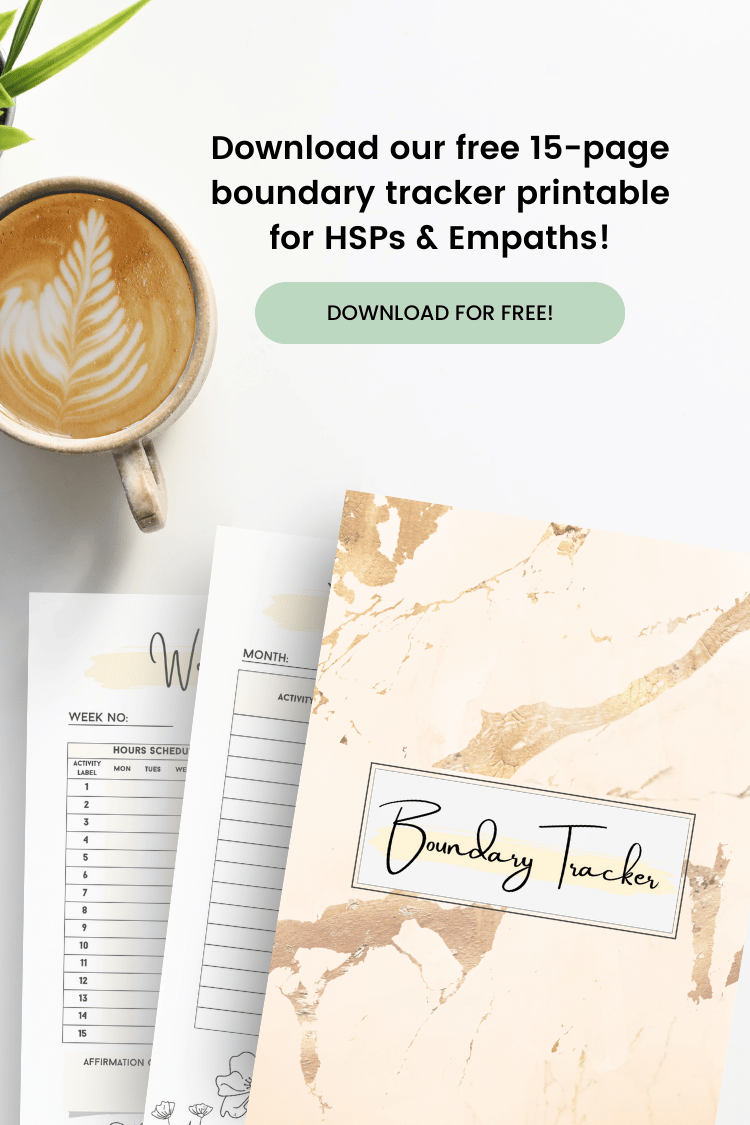Explore 10 common signs of anxiety in HSPs and empaths, and understand their impact on mind and body.
Estimated reading time: 33 minutes
Anxiety is like a silent whisper, often overlooked yet profoundly impactful, especially in the lives of highly sensitive people (HSPs) and empaths. It’s an emotion that can sneak up on you, shaping your day-to-day experiences.
In this blog, we delve into the 10 common signs of anxiety, exploring how they manifest in the body and mind.
Here’s What You’ll Discover:
#1 Excessive Worrying
The first sign of anxiety often lies in the weight of excessive worrying. Imagine a mind like a spinning wheel, constantly turning over thoughts, scenarios, and possibilities.
For someone experiencing anxiety, this worrying isn’t just occasional; it’s persistent and can feel overwhelming. It’s like having a background app constantly running in your mind, draining your mental battery.
This type of worry often goes beyond what might be considered ‘normal’ concerns, extending to almost every aspect of daily life.
#2 Sleep Disturbances
When anxiety takes hold, it often brings along a companion: sleep disturbances. Falling asleep might feel like trying to tame a wild ocean with your thoughts crashing like waves. Or, you might find yourself waking up in the middle of the night, your mind racing with worries that refuse to be silenced.
The relationship between anxiety and sleep is complex. Anxiety can lead to sleep problems, and in turn, a lack of sleep can exacerbate feelings of anxiety, creating a challenging cycle.
#3 Difficulty Concentrating
Have you ever tried to focus on a task, only to find your thoughts scattered like leaves in the wind? This is a common experience for those with anxiety.
It’s as if your mind is a radio, constantly switching between stations without ever settling on one. This can make concentrating on work, conversations, or even simple tasks feel like navigating through a fog.
#4 Muscle Tension
Often, what we feel in our minds is mirrored in our bodies. Anxiety frequently manifests as muscle tension. This isn’t just a metaphorical tightening; it’s a physical sensation. Your shoulders might feel like they’re carrying an invisible weight, or your jaw might clench as if bracing against the worries.
It’s a sign of your body’s response to perceived stress, preparing to react to the anxiety that your mind is experiencing.
We will continue exploring these signs, delving into how they manifest and affect those who experience them. This journey through the signs of anxiety is an invitation to explore deeper insights and resources available in our Ideal Self Membership, where we delve into “Overcoming Overwhelm & Anxiety Through the Body” with Nichola Day from Sensitive Yoga Therapy. Stay tuned as we unravel more about this complex and deeply personal experience.

#5 Irritability
Irritability can be a subtle yet significant sign of anxiety. It’s like a simmering pot, ready to bubble over at the slightest provocation. When you’re anxious, your tolerance level might decrease, and small annoyances can feel magnified.
This irritability isn’t just a mood swing; it’s a sign of the internal struggle that anxiety can create. It’s as if your emotional skin is thinner, making you more reactive to the everyday stimuli that you might normally brush off.
#6 Fatigue
Contrary to what some might think, anxiety isn’t always about feeling hyperactive or restless. It can also manifest as profound fatigue.
This isn’t just the regular tiredness after a long day; it’s a deep, bone-weary exhaustion that doesn’t seem to improve with rest. It’s as if your body and mind are constantly running a marathon with no finish line in sight, draining your energy reserves.
#7 Sensitivity to Noise
For many with anxiety, there’s an increased sensitivity to noise. Sounds that others might not notice can feel overwhelming or jarring. It’s like your nervous system is turned up to a higher volume, making the everyday soundscape feel like a cacophony.
This heightened sensitivity can be particularly challenging for HSPs and empaths, who are already more attuned to their sensory environment.
#8 Excessive Worry about Safety
Anxiety often brings with it an excessive worry about safety – both one’s own and that of loved ones. This can manifest as a heightened sense of vigilance or a constant scanning of the environment for potential threats.
It’s like living with an overactive alarm system that is too eager to warn you of danger, even when the threat is minimal or nonexistent.
#9 Persistent Indecisiveness
Anxiety can make decision-making feel like an insurmountable task. Even small choices can seem daunting, as if every decision carries an immense weight.
This indecisiveness stems from the fear of making the wrong choice, leading to endless what-ifs and second-guessing. It’s as if your mind is caught in a loop, unable to move forward confidently.
#10 Avoidance of Social Situations
Lastly, anxiety often leads to the avoidance of social situations. This isn’t just shyness or introversion; it’s a deeper sense of apprehension or fear about interacting with others.
Social gatherings might feel overwhelming, and the idea of being around people can trigger anxiety. It’s a protective mechanism, an attempt to shield oneself from potential stressors in social environments.
In some cases, people may use alcohol to numb their social anxiety. In a worst case scenario, this may lead to addiction. If this is something you’re struggling with, organizations like Ohio Community Health can help you in your recovery journey.
Recognizing the Signs as a Path to Understanding
Recognizing these signs of anxiety is not about self-diagnosis but about self-awareness. It’s the first step in understanding the complex experience of anxiety, especially for HSPs and empaths. While we haven’t delved into solutions in this blog, it’s important to remember that understanding is the foundation for growth and healing.
In our Ideal Self Membership, we deeply explore topics like “Reducing Overwhelm & Anxiety Through Yoga Therapy” with Nichola Day from Sensitive Yoga Therapy. We invite you to join this journey of personal growth, where we offer resources like masterclasses, e-books, and daily exercises specifically designed for those who experience the world with heightened sensitivity.
Your journey through anxiety is uniquely yours, and we are here to support you every step of the way.
You May Also Enjoy Reading These Articles
Disclaimer: In this article, we collaborated with AI while writing articles, meaning that we used it as a personal assistant to provide valuable information to our readers. The personal touch through stories and personal examples and the editing of the article have been performed by the author.









